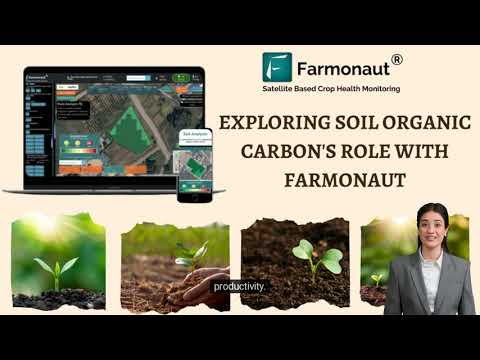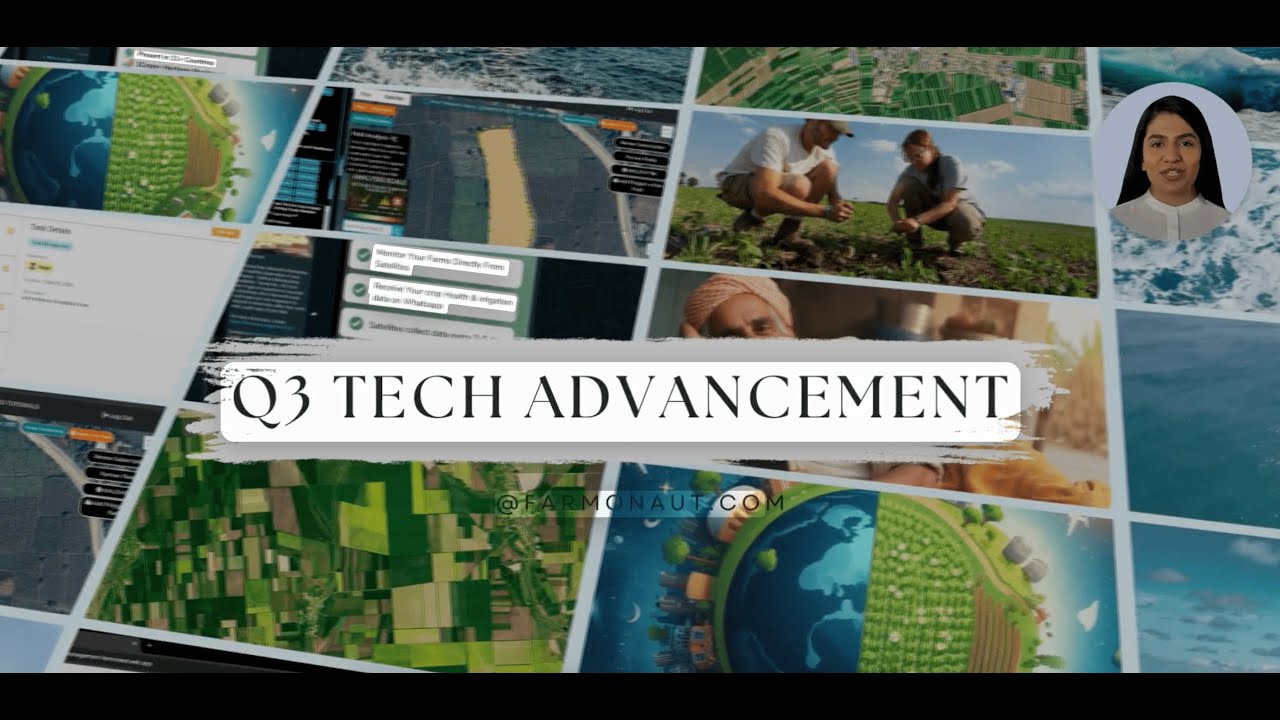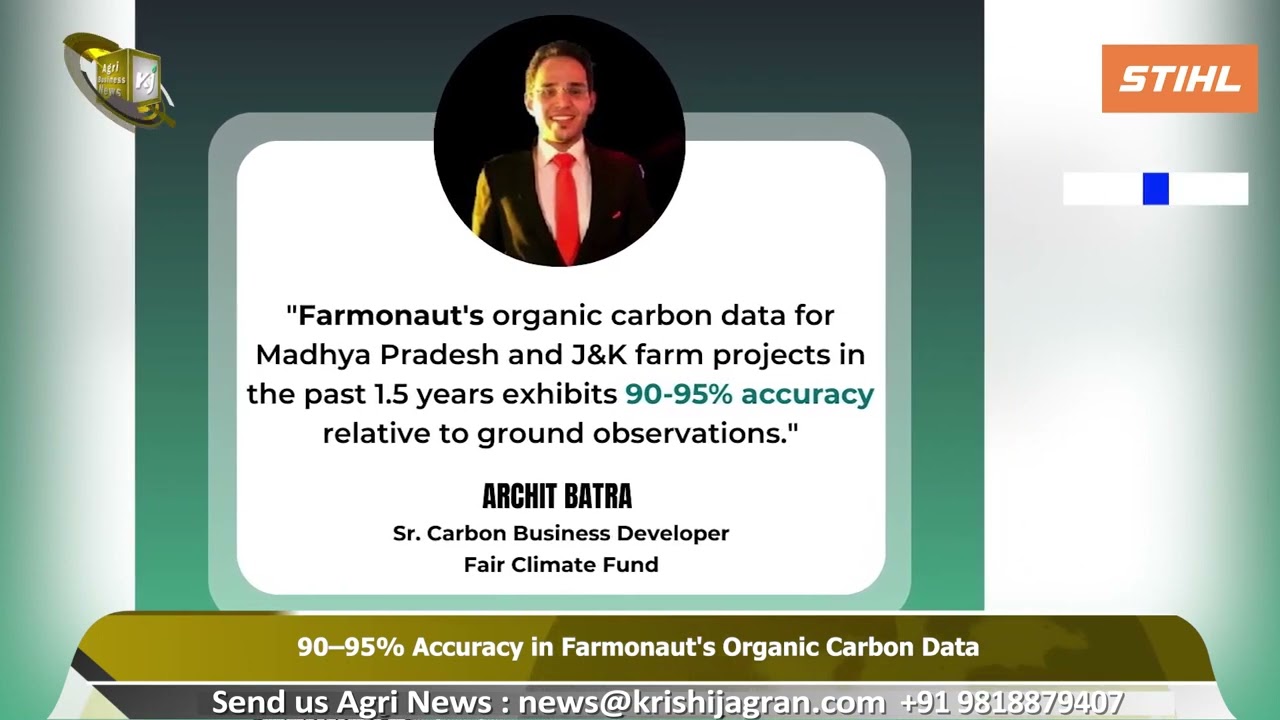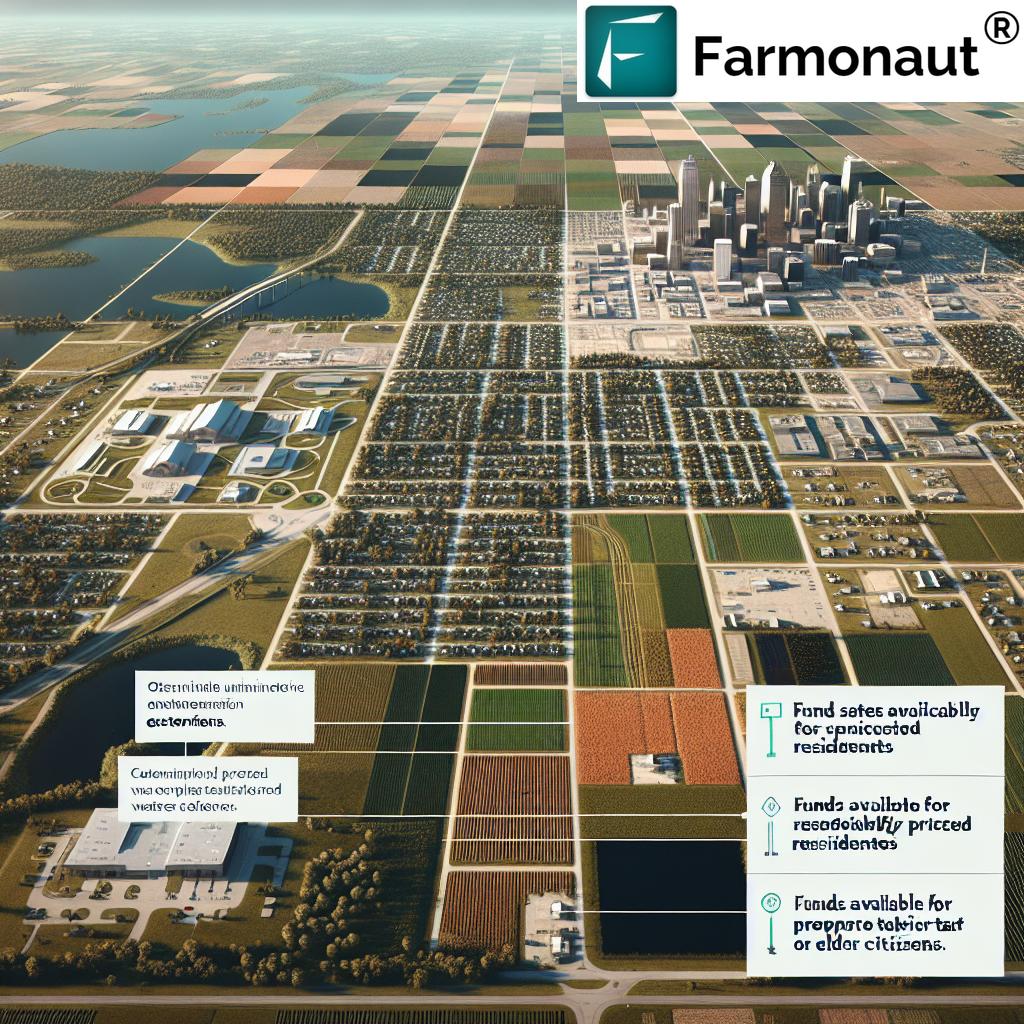Revolutionizing Midwest Agriculture: How Carbon Intensity Monitoring Drives Sustainable Farming and Crop Yield Optimization
“The pilot program integrates precision agriculture tools with generative AI, potentially impacting millions of acres of Midwest farmland.”
In the heart of America’s breadbasket, a revolutionary change is taking root. As we step into a new era of agriculture, the Midwest is at the forefront of a transformative movement that promises to reshape the way we think about farming, sustainability, and crop production. At the center of this agricultural renaissance is an innovative approach to carbon intensity monitoring, a technology that’s not just changing the game – it’s rewriting the rules entirely.
Today, we’re excited to delve into the groundbreaking pilot program that’s set to launch on April 14, 2025, involving more than a dozen farms and agribusinesses across the Midwest. This initiative isn’t just another tech upgrade; it’s a comprehensive solution that addresses critical pain points for farmers while paving the way for a more sustainable and productive future in agriculture.

The Dawn of a New Agricultural Era
As we witness the convergence of cutting-edge technology and time-honored farming practices, it’s clear that we’re standing at the threshold of a new agricultural paradigm. The ZPTAG® Carbon Intensity Pilot, spearheaded by Genuine Marketing Group Inc. (OTC: GMGZ), is more than just a technological advancement – it’s a holistic approach to farming that promises to revolutionize how we grow food, manage resources, and protect our environment.
This innovative platform combines advanced data management, generative AI, and real-world agricultural challenges to offer a comprehensive solution for:
- Carbon footprint reduction
- Soil health monitoring
- Crop yield optimization
- Water quality improvement
- Biodiversity enhancement
By leveraging these technologies, we’re not just improving farm productivity; we’re fostering a more resilient and sustainable agricultural ecosystem that can withstand the challenges of climate change and increasing global food demand.
Addressing Farmer Pain Points
One of the most compelling aspects of this pilot program is its laser focus on addressing real-world challenges faced by farmers. By working directly with those who have their hands in the soil, GMGZ and ZPTAG® are ensuring that their technology isn’t just innovative – it’s practical and immediately applicable to the day-to-day operations of farms across the Midwest.
Some of the key pain points this program addresses include:
- Data Overload: Farmers often struggle with the sheer volume of data available to them. The ZPTAG® platform simplifies this by providing clear, actionable insights.
- Resource Management: Optimizing the use of water, fertilizers, and pesticides is crucial for both profitability and sustainability. The carbon intensity monitoring system helps farmers make more informed decisions about resource allocation.
- Regulatory Compliance: With increasing environmental regulations, farmers need tools to ensure they’re meeting requirements. This platform aids in tracking and reporting key sustainability metrics.
- Market Pressures: Consumers are demanding more sustainable products. This system helps farmers demonstrate their commitment to environmentally friendly practices, potentially opening up new market opportunities.
By addressing these challenges head-on, the ZPTAG® Carbon Intensity Pilot is positioning itself as an indispensable tool for modern farmers looking to thrive in an increasingly complex agricultural landscape.
The Power of Carbon Intensity Monitoring in Agriculture
At the heart of this revolutionary program is the concept of carbon intensity monitoring. But what exactly does this mean for agriculture, and why is it so important?
Carbon intensity in agriculture refers to the amount of carbon dioxide (CO2) and other greenhouse gases emitted per unit of agricultural output. By monitoring and managing this metric, farmers can:
- Reduce their environmental impact
- Improve soil health and fertility
- Increase crop yields
- Enhance overall farm productivity
The ZPTAG® platform takes this concept to the next level by providing real-time data and insights that allow farmers to make informed decisions about their practices. This isn’t just about reducing emissions – it’s about optimizing every aspect of farm operations to create a more sustainable and profitable agricultural system.
Sustainable Farming Practices: The Future of Agriculture
As we delve deeper into the capabilities of the ZPTAG® platform, it’s clear that sustainable farming practices are at the forefront of this agricultural revolution. By integrating carbon intensity monitoring with other advanced technologies, the platform is enabling farmers to adopt a range of sustainable practices that benefit both their bottom line and the environment.
Some of the key sustainable farming practices facilitated by this technology include:
- Precision Agriculture: By leveraging detailed data on soil conditions, weather patterns, and crop health, farmers can apply inputs like water and fertilizer with pinpoint accuracy, reducing waste and maximizing efficiency.
- Conservation Tillage: The platform provides insights that support reduced tillage practices, helping to preserve soil structure, reduce erosion, and increase carbon sequestration.
- Cover Cropping: Data-driven recommendations for cover crop selection and management help improve soil health, reduce nutrient runoff, and enhance biodiversity.
- Integrated Pest Management: Advanced monitoring capabilities allow for more targeted and reduced use of pesticides, promoting ecological balance and reducing environmental impact.
These practices, supported by the robust data and insights provided by the ZPTAG® platform, are helping to transform Midwest agriculture into a model of sustainability and efficiency.
Soil Health Monitoring: The Foundation of Sustainable Agriculture
One of the most critical aspects of the ZPTAG® Carbon Intensity Pilot is its focus on soil health monitoring. Healthy soil is the foundation of sustainable agriculture, and this innovative platform provides farmers with unprecedented insights into the condition of their soil.
Through advanced sensors and data analysis, the system monitors key soil health indicators such as:
- Organic matter content
- Nutrient levels
- Soil structure and porosity
- Microbial activity
- Water retention capacity
By tracking these factors in real-time, farmers can make informed decisions about soil management practices, leading to improved soil health, increased carbon sequestration, and ultimately, better crop yields.
“Carbon intensity monitoring in agriculture could reduce greenhouse gas emissions by up to 30% while optimizing crop yields.”
Crop Yield Optimization: Where Science Meets Agriculture
While sustainability is a key focus of the ZPTAG® platform, it’s equally committed to helping farmers optimize their crop yields. By combining carbon intensity monitoring with advanced crop management techniques, the system provides a holistic approach to yield optimization.
Key features that contribute to crop yield optimization include:
- Predictive Analytics: Using historical data and machine learning algorithms, the platform can predict potential yield issues before they become problematic.
- Nutrient Management: Precise recommendations for fertilizer application based on soil health data and crop needs.
- Water Management: Optimized irrigation schedules that consider soil moisture levels, weather forecasts, and crop water requirements.
- Pest and Disease Monitoring: Early detection and targeted treatment recommendations to minimize crop losses.
These features work in concert to help farmers maximize their yields while minimizing resource use and environmental impact.

Agricultural Data Management: Turning Information into Action
In today’s data-driven world, effective agricultural data management is crucial for farm success. The ZPTAG® platform excels in this area, providing a centralized system for collecting, analyzing, and acting on farm data.
Key aspects of the platform’s data management capabilities include:
- Data Integration: The system can integrate data from various sources, including satellite imagery, weather stations, soil sensors, and farm equipment.
- User-Friendly Interface: Despite the complexity of the data being processed, the platform presents information in an intuitive, easy-to-understand format.
- Real-Time Updates: Farmers receive up-to-the-minute information, allowing for quick decision-making and rapid response to changing conditions.
- Historical Analysis: The platform maintains detailed historical records, enabling farmers to track long-term trends and make informed planning decisions.
By turning vast amounts of data into actionable insights, the ZPTAG® platform is empowering farmers to make smarter, more informed decisions about every aspect of their operations.
Farm Ecosystem Benefits: Beyond the Field
While the immediate benefits of the ZPTAG® Carbon Intensity Pilot are clear for individual farms, the broader implications for farm ecosystems are equally significant. By promoting sustainable practices and providing detailed ecosystem monitoring, the platform is helping to create more resilient and biodiverse agricultural landscapes.
Some of the key ecosystem benefits include:
- Improved Water Quality: By optimizing fertilizer use and reducing runoff, the system helps protect local water sources from pollution.
- Enhanced Biodiversity: Sustainable farming practices supported by the platform create better habitats for beneficial insects, birds, and other wildlife.
- Carbon Sequestration: Improved soil health leads to increased carbon storage, helping to mitigate climate change.
- Reduced Chemical Use: Precision application of pesticides and herbicides minimizes their impact on non-target species and the broader environment.
These ecosystem benefits extend far beyond the boundaries of individual farms, contributing to the overall health and sustainability of the entire agricultural region.
Integrating Precision Agriculture Tools
The ZPTAG® platform doesn’t exist in isolation – it’s designed to integrate seamlessly with a wide range of precision agriculture tools. This integration allows farmers to leverage their existing technology investments while gaining the additional benefits of carbon intensity monitoring and advanced data analytics.
Some of the precision agriculture tools that can be integrated with the ZPTAG® platform include:
- GPS-guided tractors and harvesting equipment
- Drone-based crop monitoring systems
- Variable rate applicators for fertilizers and pesticides
- Soil moisture sensors and weather stations
- Yield monitoring systems
By bringing all these tools together under a single, unified platform, ZPTAG® is creating a truly comprehensive farm management system that addresses every aspect of modern agriculture.
The Role of Generative AI in Sustainable Agriculture
One of the most exciting aspects of the ZPTAG® Carbon Intensity Pilot is its use of generative AI to provide personalized recommendations and insights. This cutting-edge technology takes the vast amounts of data collected by the platform and uses it to generate specific, actionable advice for each farm.
Some of the ways generative AI is being applied in this context include:
- Crop Rotation Planning: AI algorithms can suggest optimal crop rotation schedules based on soil health data, market trends, and environmental factors.
- Pest Management Strategies: By analyzing historical pest data and current conditions, the AI can recommend targeted, minimally invasive pest control measures.
- Resource Allocation: The system can generate detailed plans for water and fertilizer use, optimizing resource allocation across the farm.
- Yield Forecasting: Advanced AI models can predict crop yields with increasing accuracy, helping farmers make informed decisions about planting and harvesting.
This application of generative AI is pushing the boundaries of what’s possible in sustainable agriculture, providing farmers with a level of insight and decision-making support that was previously unimaginable.
Economic Impact and Monetization Opportunities
While the environmental benefits of the ZPTAG® Carbon Intensity Pilot are clear, it’s equally important to consider the economic impact on farmers and agribusinesses. The platform offers several avenues for improved profitability and new revenue streams:
- Increased Crop Yields: By optimizing growing conditions and resource use, farmers can expect to see improved yields and higher-quality crops.
- Reduced Input Costs: Precision application of water, fertilizers, and pesticides can significantly lower input costs.
- Access to Premium Markets: The ability to verify sustainable practices can open up opportunities in premium and specialty markets.
- Carbon Credit Opportunities: As carbon markets develop, farmers using this system will be well-positioned to participate and generate additional income.
- Data Monetization: With proper privacy safeguards, aggregated farm data could become a valuable commodity in the agricultural sector.
These economic benefits make the adoption of carbon intensity monitoring and sustainable farming practices not just an environmental imperative, but a sound business decision as well.
Pilot Program Details and Participant Feedback
The ZPTAG® Carbon Intensity Pilot is set to launch on April 14, 2025, with participation from over a dozen farms and agribusinesses across the Midwest. This diverse group of participants will provide valuable feedback on the platform’s functionality, user interface, and overall impact on their operations.
Key aspects of the pilot program include:
- Duration: The initial pilot is scheduled to run for one full growing season, with the possibility of extension based on results and participant feedback.
- Training and Support: Participants will receive comprehensive training on the ZPTAG® platform, along with ongoing technical support throughout the pilot.
- Data Collection: The program will gather extensive data on the platform’s performance, its impact on farm operations, and its effectiveness in reducing carbon intensity.
- Feedback Mechanisms: Regular check-ins and surveys will be conducted to gather participant insights and suggestions for improvement.
Initial feedback from participants has been overwhelmingly positive, with many expressing excitement about the platform’s potential to transform their operations. As Dennis Schreier, EVP of Operations at Farmward Cooperative, noted, “GMGZ’s commitment to supporting agriculture and creating avenues for added value aligns perfectly with our mission of advancing farming for future generations.”
The Future of Midwest Agriculture
As we look to the future, it’s clear that the ZPTAG® Carbon Intensity Pilot represents more than just a technological advancement – it’s a glimpse into the future of Midwest agriculture. By combining carbon intensity monitoring with advanced data analytics, generative AI, and a deep understanding of real-world farming challenges, this platform is setting a new standard for sustainable and efficient agriculture.
Some of the long-term implications of this technology include:
- Increased Resilience: Farms using this technology will be better equipped to handle climate variability and extreme weather events.
- Improved Food Security: Optimized crop yields and more sustainable farming practices will contribute to more stable food production.
- Environmental Stewardship: Widespread adoption of these practices could significantly reduce agriculture’s environmental footprint.
- Economic Sustainability: By improving efficiency and opening up new revenue streams, this technology can help ensure the long-term economic viability of Midwest farms.
As we move forward, the lessons learned from this pilot program will undoubtedly shape the future of agriculture not just in the Midwest, but across the globe.
Comparative Analysis of Carbon Intensity Monitoring Benefits
| Agricultural Aspect | Traditional Farming Methods | Carbon Intensity Monitoring Approach | Estimated Improvement (%) |
|---|---|---|---|
| Soil Health | Periodic soil testing, general fertilizer application | Real-time soil health monitoring, precision nutrient management | 30-40% |
| Crop Yield | Historical data and experience-based planning | AI-driven predictive analytics, optimized resource allocation | 15-25% |
| Water Quality | Standard irrigation practices, limited runoff control | Precision irrigation, advanced runoff management systems | 40-50% |
| Carbon Sequestration | Limited focus on carbon capture | Active carbon sequestration strategies, soil carbon monitoring | 50-60% |
| Biodiversity | Monoculture practices, limited habitat consideration | Integrated ecosystem management, biodiversity-friendly practices | 20-30% |
| Resource Efficiency | Generalized resource application | Precision application of water, fertilizers, and pesticides | 25-35% |
Frequently Asked Questions
- What is carbon intensity monitoring in agriculture?
Carbon intensity monitoring in agriculture refers to the measurement and tracking of greenhouse gas emissions per unit of agricultural output. It helps farmers understand and reduce their carbon footprint while optimizing production. - How does the ZPTAG® platform improve crop yields?
The ZPTAG® platform improves crop yields by providing real-time data on soil health, weather conditions, and crop status. It uses AI to generate personalized recommendations for resource management and pest control, leading to optimized growing conditions. - What types of farms can benefit from this technology?
While the pilot is focused on Midwest farms, the technology is adaptable to various farm types and sizes. It can benefit row crop farms, specialty crop operations, and even livestock farms by optimizing resource use and improving sustainability. - How does the platform integrate with existing farm equipment?
The ZPTAG® platform is designed to integrate with a wide range of precision agriculture tools, including GPS-guided equipment, drones, and various sensors. It can collect and analyze data from these sources to provide comprehensive insights. - What are the potential economic benefits for farmers?
Farmers can benefit economically through increased crop yields, reduced input costs, access to premium markets for sustainably grown products, and potential participation in carbon credit markets.
Conclusion: A New Chapter in Midwest Agriculture
As we stand on the brink of this agricultural revolution, it’s clear that the ZPTAG® Carbon Intensity Pilot represents a significant leap forward in our quest for sustainable, efficient, and productive farming practices. By addressing critical pain points for farmers, leveraging cutting-edge technology, and focusing on both environmental and economic sustainability, this program is setting a new standard for agriculture in the Midwest and beyond.
The integration of carbon intensity monitoring, advanced data analytics, and generative AI is not just improving farm operations – it’s transforming the very nature of agriculture. As we move forward, the insights gained from this pilot program will undoubtedly shape the future of farming, helping to create a more resilient, sustainable, and productive agricultural sector.
For farmers, agribusinesses, and consumers alike, this revolution in Midwest agriculture promises a future where environmental stewardship and economic prosperity go hand in hand. As we continue to innovate and adapt, we’re not just changing how we farm – we’re redefining what it means to be good stewards of the land for generations to come.
Earn With Farmonaut: Affiliate Program
Earn 20% recurring commission with Farmonaut’s affiliate program by sharing your promo code and helping farmers save 10%. Onboard 10 Elite farmers monthly to earn a minimum of $148,000 annually—start now and grow your income!
Access Farmonaut’s Innovative Agricultural Solutions
Ready to revolutionize your farming practices? Access Farmonaut’s cutting-edge agricultural solutions through our various platforms:
For developers interested in integrating Farmonaut’s powerful agricultural data into their own applications, check out our API and API Developer Docs.





















Loving the info on this website , you have done outstanding job on the posts.